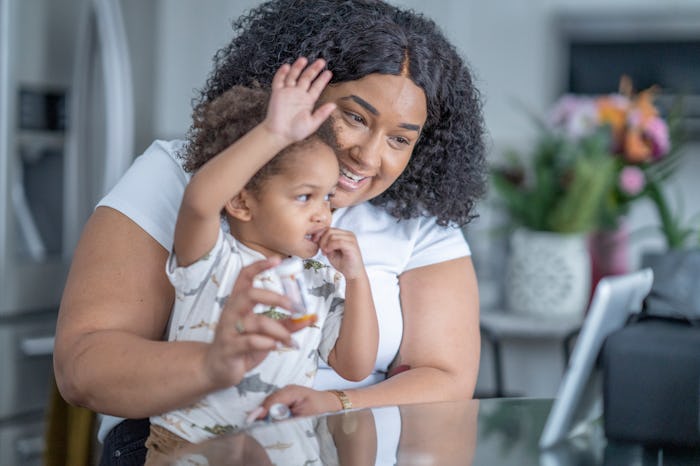Coronavirus

This Is Exactly How Long You Should Quarantine Before Seeing Family
It's not as straightforward as you might think.
By this point in the pandemic, plenty of people are more than ready to reconnect with loved ones and return to some sense of normalcy. However, COVID-19 is still a reality, even as the vaccines reach more people each day. If you are planning to see loved ones who live outside your household, then how long should you quarantine before seeing family? Physicians who are working on the front lines shared their insights about the safest ways to reconnect with loved ones.
Recently, the Centers of Disease Control and Prevention (CDC) issued this statement on quarantining for fewer than 14 days: "Quarantine can end after Day 10 without testing and if no symptoms have been reported during daily monitoring." However, the full 14 days is still recommended in most cases.
"The more we learn, the more it appears that shorter quarantine could be as effective so the CDC's recommendation is something I am comfortable recommending to my patients," Dr. Stella A. Safo, MD, a primary care physician specializing in HIV care, tells Romper via email. "However, longer time taken to quarantine to ensure someone does not have COVID is obviously the safest of all; so if someone wants to be extra sure, taking the full 14 days is reasonable."
The definition of a true quarantine
Although quarantining before meeting up with friends and family is an option, physicians stressed the difficulty of following a true quarantine. “The safest option is to avoid gathering all together. If folks are considering a quarantine period before gathering, it would need to be true quarantine (not leaving the home to go to the grocery store, bank, pharmacy, etc.) for 14 days prior to a visit – and that should be on both ends (the persons going to someone else’s house, and the people within the receiving house as well),” Dr. Jeannie Kenkare, Founder of PhysicianOne Urgent Care, tells Romper. “If that is not possible, then not getting together at all indoors would be best.” For many people, it can be difficult to make a true quarantine work in the real world.
That being said, “Quarantining should theoretically work to keep people safe if it's done correctly,” says Dr. Safo. Correct quarantining means spending 10 to 14 days avoiding high risk situations such as public transport or dining out, and then testing to assess your risk, she explains. “However, in reality, the travel to your loved ones may itself represent an opportunity for infection, as you get in and out of your car to grab meals and as you take commercial airlines,” she says.
Ways to celebrate if you don't have time for a true quarantine
Instead, the physicians interviewed for this piece are encouraging people to consider virtual visits with loved ones. "We know people are exhausted and fatigued and want to see their family, but it’s not the time to give up on public health measures," as Dr. Eve Bloomgarden, endocrinologist with Illinois Medical Professionals Action Collaborative, tells Romper. In most cases, a fun Zoom party is still the safest way to catch up with your friends and family.
And to be fair, all of these physicians are human, too, and they understand that asking others to spend still more time away from friends and family is rough. “We understand just how hard this is. We are in the same boat as everyone else,” says Dr. Bloomgarden, who hasn’t seen some family members since Thanksgiving 2019. (She also has young children and understands just how precious those early years are.) But with hospitals and ICUs across the country already at capacity, Dr. Bloomgarden stresses the importance of continuing isolation to help curb the overall spread of COVID-19.
Remember too that most of the physicians are optimistic about the vaccine and a general return to normalcy in the coming months. “I do think by this time next year we should be in a very different place,” says Dr. Bloomgarden. Hopefully, the return to in-person celebrations and festivities isn't too far away, but for the time being more socially distanced, virtual visits may be the safest choice.
Experts sourced:
Dr. Eve Bloomgarden, MD, endocrinologist with IMPACT (Illinois Medical Professionals Action Collaborative)
Dr. Jeannie Kenkare, founder of PhysicianOne Urgent Care
Stella A. Safo, MD, MPH, HIV primary care doctor and public health expert based in New York
This article was originally published on